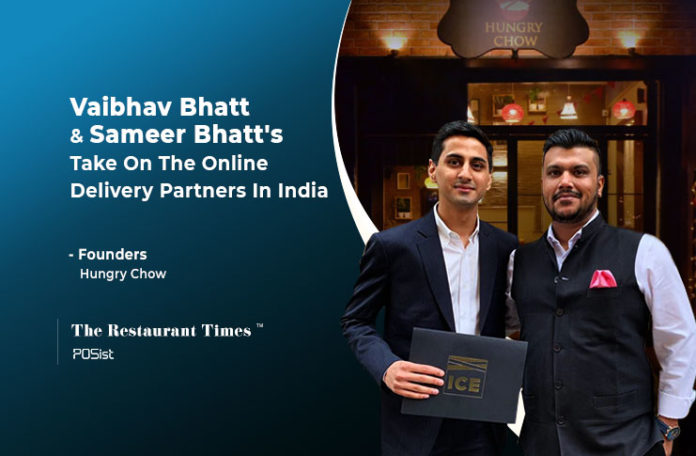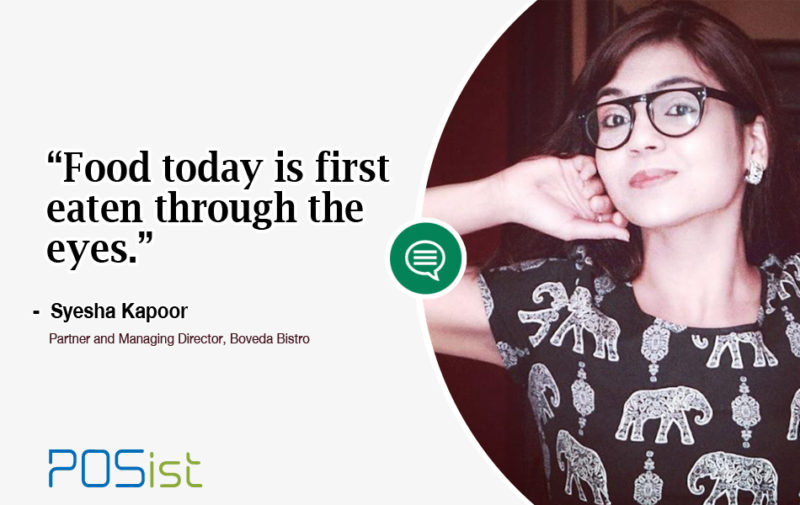The Hungry Chow was founded by the brothers, Vaibhav Bhatt and Sameer Bhatt. It was launched in 2015. The Hungry Chow was started to serve the late-night cravings of patrons. Bhatt tells that Noida has a lack of good food places delivering post-midnight. Initially, they started Hungry Chow as a cloud kitchen but later turned it into a full-fledged cafe with delivery as well.
In Conversation With Vaibhav Bhatt and Sameer Bhatt Of Hungry Chow
In an exclusive conversation with The Restaurant Times, Vaibhav Bhatt and Sameer Bhatt talk of his journey in the industry, the story behind Hungry Chow, staff management, take on online delivery partners and a lot more.
Hungry Chow’s USP
Bhatt believes that it is essential to serve premium quality food. The consistency has to be maintained. At Hungry Chow, the consistency of the food is maintained at all times. Customers expect consistent service at all times because they don’t like unpleasant surprises. A consistent service means having uniformity in terms of speed, quality and courtesy in delivering the service to the customers, regardless of time and occasion. Also, the portion size of the food served is tummy filling. Bhatt himself acquires the raw materials for his outlet every morning and ensures that the supply is fresh.
Staff Management
The Indian Restaurant Industry is evolving day by day. Thanks to rapid urbanization and an evolved dining out culture. With the thriving business, comes the challenges with it.
From acquiring licenses, deciding the restaurant’s concept, targeting the audience, all this takes a lot of time.
According to Bhatt, recruiting reliable staff is a major issue in the restaurant industry. Hungry Chow started as a cloud kitchen, so the delivery staff has always played a major role in the business. Initially, due to the lack of experience in the industry, Bhatt found it difficult to recruit delivery executives.
‘To make sure whether the delivery executives are safe and have delivered food timely, I used to communicate with the customers and ask them about the behaviour, timing of the delivery executive,’ says Bhatt.
With experience, Bhatt was able to hire the delivery executives without much problem. He used to conduct a proper background check, before hiring anyone.
Bhatt takes pride in telling that it has been more than two years now and they have the same delivery executives and it is because of the care, timely payment, support from the management which has made them stay. Bhatt believes that even if they get a hike in their salaries, his staff won’t leave because at Hungry Chow, they treat them like family.
Pros and Cons of Third Party Aggregators
The world is seeing a major transmutation in the way people buy and consume food. The modern consumer is less likely to cook and more likely to order pizza, pasta, or a vegan salad from a nearby restaurant while sitting at home and watching shows on Netflix. There has been a major shift from dining out to dining in now.
With Zomato, Swiggy, UberEats coming in, these on-demand delivery services offer ratings and reviews of restaurants and allow customers to pay with a single tap on their smartphones and tablets making it simpler for the patrons.
According to Bhatt, there are both pros and cons with the coming of the food aggregators.
Pros include being discoverable to a wide base of customers on the online platform. Patrons discover new restaurants on this platform. This in turns helps the restaurants to be known among a wider customer base and also has more business.
‘When third party food aggregators crash for even a day, it is a loss for us, because we lose out on a lot of business. This has happened a few times and it was a severe loss for us. We acquire extra inventory for delivery purposes and when we lose out on such deliveries, a lot of food is wasted,’ says Bhatt.
Apart from the wastage, food aggregators like Zomato used to share customer details earlier, which now they do not. The delivery executive at times reaches the wrong location and there is no option to contact. In this case, customers do not blame the food aggregators but instead blame the outlet and give them negative reviews and ratings. This effects them adversely.
Also, Bhatt concludes by saying that Zomato should train their staff better so that they deliver a better customer experience.
Technology Bedding
According to the National Restaurant Association, 32% of operators think their business is lagging in-restaurant technologies. it’s important for restaurants to start using these technologies, and that they expect to use technology more often in the coming year to order food. Consumers want to see the new technology they use integrated into their dining experience. As restaurateurs, it has become essential for them to integrate technology into the restaurant business.
According to Bhatt, with POS software coming, it has become very easy to access the real-time reports and analytics from any corner of the world. It has become very easy for them to track and maintain the owner and staff relationship. Their own internal operations are tracked and managed well. Apart from this, the customer’s loyalty program helps them to manage the relationship with the customers by sending targeted messages/mails which was not possible until a few years ago.
Bhatt also mentions, with the benefits come to the demerits. With adopting new technology in restaurants, there might be resistance from the staff initially because they might not like the idea of adapting something new all of a sudden. The processes were running a certain way and when it gets altered, the staff might at times be reluctant to understand. It might be a task to make the staff understand the value of implementing new technology.
While catering to a larger market, implementing new technology might not be smooth. Understanding customer behaviour, preferences in accordance with technology will take time.
Undoubtedly, with technology, a lot of time has been saved and made life simpler.

















